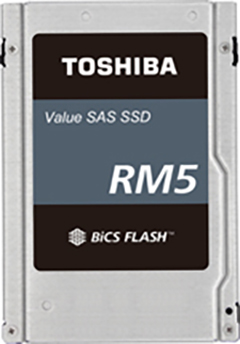Please select your location and preferred language where available.
Toshiba Memory’s Value SAS SSDs Earn VMware vSAN Certification Running on HPE ProLiant Gen10 Servers
New RM5 Series of Value SAS SSDs Approved for vSAN 6.7 Customers
SAN JOSE, Calif., July 18, 2019 – Toshiba Memory America, Inc. (TMA), the U.S.-based subsidiary of Toshiba Memory Corporation, today announced that VMware vSAN™ 6.7 certification has been earned for its RM5 Series of value SAS SSDs running on HPE ProLiant Gen10 servers1. The 12 gigabits per second (Gb/s) RM5 Series with VMware vSAN 6.7 and VMware ESXi™ 6.7 certification is now listed in the VMware Compatibility Guide2 and available through the same channels in which HPE ProLiant servers are sold.
VMware vSAN 6.7 is the most current vSAN release supported on HPE ProLiant Gen10 servers, enabling Toshiba Memory’s RM5 Series SSDs to be shared across connected hosts in a VMware vSphere® cluster. Users are able to pool RM5 SSDs together in a single, distributed shared data store and provided high confidence that these value SAS SSDs will operate optimally on HPE ProLiant Gen10 servers running a vSAN solution.
RM5 Series SSDs deliver faster, lower latency storage performance than enterprise SATA SSDs and support up to 64 percent3 higher maximum bandwidth. These drives also reduce the query time of a TPC Benchmark™ H-like (or TPC-H) analytical workload by up to 25 percent4 as validated through third-party benchmark testing. At similar price points to SATA SSDs, the RM5 Series delivers significantly more performance per dollar and is designed to replace enterprise SATA SSDs in server applications.
“For many applications, enterprise SATA SSDs may become a bottleneck to the server, preventing the CPU from reaching its operational or transactional potential. Given that the top workloads for VMware vSAN are transactional databases, storage performance is critical,” said Lee Caswell, vice president of products, Storage and Availability Business Unit, VMware. “We are pleased to collaborate closely with Toshiba Memory, certifying their new class of SSD for the fast-growing hyper-converged infrastructure market, providing customers with greater value and performance.”
“Our RM5 SSDs demonstrate a significant improvement in performance and cost-efficiency of server solutions. By improving performance at similar price points to SATA, the RM5 Series delivers up to 22 percent5 better data analytics performance per dollar,” said Alvaro Toledo, vice president of SSD marketing and product planning, Toshiba Memory America, Inc. “Achieving VMware vSAN 6.7 certification for our RM5 value SAS SSDs provides customers with the value, performance and confidence they need when deploying a vSAN solution.”
“We continue to introduce the most innovative technology in HPE ProLiant servers, enabling customers to improve application performance across new, demanding workloads in order to accelerate the delivery of new ideas, products and services,” said Katherine Toups, director Hybrid IT Shared Server Options at HPE. “Through our latest collaboration with Toshiba Memory, combining HPE ProLiant servers with new, cost-effective SAS SSDs from Toshiba Memory, we are delivering a boost in application and system value for vSAN users while making the upgrade process easier.”
For further information about Toshiba Memory’s RM5 value SAS SSDs in HPE ProLiant servers or how Toshiba Memory can help you prepare for “life after SATA,” visit https://us.toshiba-memory.com/hpe.
About Toshiba Memory America, Inc.
Toshiba Memory America, Inc. is the U.S.-based subsidiary of Toshiba Memory Corporation, a leading worldwide supplier of flash memory and solid state drives (SSDs). From the invention of flash memory to today’s breakthrough 96-layer BiCS FLASH™ 3D technology, Toshiba Memory continues to lead innovation and move the industry forward. For more information, please visit business.toshiba-memory.com and follow us on social media.
Notes:
1 VMware vSAN 6.7 certification has been earned for Toshiba Memory’s RM5 Series of value SAS SSDs running on HPE ProLiant Gen10 servers.
2 The VMware Compatibility Guide is available at: https://www.vmware.com/resources/compatibility/vcl/result.php?search=KRM5&searchCategory=all&%26lpos%3Dapps_scodevmw+%3A+0=Search
3 From the Principled Technologies® Report entitled, “Make business decisions faster with value SAS and data center NVMe™ SSDs from Toshiba Memory,” and available at: https://principledtechnologies.com/portfolio-marketing#Toshiba, June 2019, page 3. The 64 percent higher maximum bandwidth was determined as follows:
Time to complete the query set: Enterprise SATA SSDs = 36:53. Value SAS SSDs = 27:37.
36:53 - 27:37 / 36:53 = 35.7 -100 percent = 64.2 percent.
4 From the Principled Technologies Report entitled, “Make business decisions faster with value SAS and data center NVMe SSDs from Toshiba Memory,” and available at: https://principledtechnologies.com/portfolio-marketing#Toshiba, June 2019, page 3. The 25 percent query time reduction was determined as follows:
Time to complete the query set: Enterprise SATA SSDs = 36:53. Value SAS SSDs = 27:37.
27:37 / 36.53 = 0.75 -100 percent = 25 percent.
5 From the Principled Technologies Report entitled, “Make business decisions faster with value SAS and data center NVMe SSDs from Toshiba Memory,” and available at: https://principledtechnologies.com/portfolio-marketing#Toshiba, June 2019, page 4.
The 22 percent better data analytics performance per dollar was determined as follows:
Cost per iteration: Enterprise SATA SSDs = $11.51. Value SAS SSDs = $8.96.
$8.96 / $11.51 = 0.78 -100 percent = 22 percent.
NVMe is a trademark of NVM Express, Inc. Principled Technologies is a registered trademark of Principled Technologies, Inc. TPC BenchmarkH (or TPC-H) is a trademark of the Transaction Processing Performance Council. VMware ESXi, VMware vSAN and VMware vSphere are trademarks or registered trademarks of VMware, Inc. in the United States and/or various jurisdictions. All other trademarks or registered trademarks are the property of their respective owners.
- Information in this press release, including product pricing and specifications, content of services, and contact information is current and believed to be accurate on the date of the announcement, but is subject to change without prior notice. Technical and application information contained here is subject to the most recent applicable Toshiba Memory product specifications.
